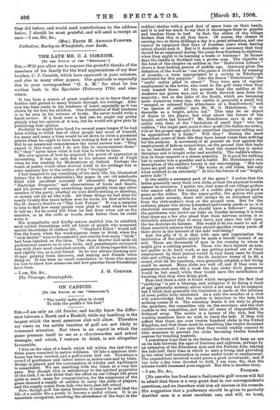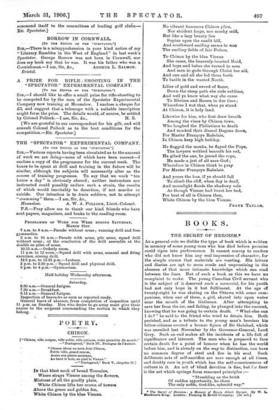ON CADDIES.
[To THE EDITOR OF THE "SezerAzos..1
"The usefu' cadie plies in street To bide the profits o' his feet."
SIR,—I am only an old foozler, and hardly know the differ- ence between a Hawk and a Haskell, while my handicap is the largest which the most generous club will allow. Therefore my views on the subtle beauties of golf are not likely to command attention. But there is an aspect in which the game presents itself to me as a churchwarden and school manager, and which, I venture to think, is not altogether
favourable.
I live on the edge of a heath which till within the last two or three years remained in native wildness. Of late a spacious club- house has been erected, and a golf-course laid out. Nowadays a crowd of gentlemen and ladies arrive in motor-cars and by train. Bridge is played, and the consumption of whisky and Apollinaris is remarkable. We are marching with the times at a very fair pace. But though this is satisfactory to the spirited proprietor of the club, I do not think that the effect on our village life gives quite so much cause for congratulation, for the exigencies of the game demand a supply of caddies to carry the clubs of players, and the supply comes from lads who have just left school. Now, though golf has many beauties, it cannot be said that the life of a caddie fits a youth to become a useful citizen. It is an uncertain occupation, involving the attendance of the boys in the caddies' shelter with a: good deal of spare time on their bands, and it is not too much to say that it encourages them to gamble and teaches them to loaf. In fact, the elders of the village declare that this is all they learn. Of course, the chance of earning two or three shillings a day is a great attraction, and one cannot be surprised that boys of fourteen years when leaving school should seek it. But is it desirable or necessary that they should be so employed during the years from fourteen to eighteen, when they ought to be learning a trade or business ? In former days the caddie in Scotland was a grown man. The vignette at the head of the chapter on caddies in the "Badminton Library" shows a dour-looking person of middle age. Jamieson gives the definition of the word as "one who gains a livelihood by running of errands,—a term appropriated to a society in Edinburgh instituted for this purpose." Like the Saxon "Dienstmann," the " usefu' cadies plied in street." They were men of regular employment in the towns, who went to the golf links when they were wanted there. At the present time the caddies at St. Andrews are grown men, and at North Berwick men form the majority ; but in the links of the South, which are becoming more numerous every day, the caddie is generally a small boy "escaped or released from attendance at a Board-school," and "no species of caddie," says Mr. H. G. Hutchinson, "is so desirable as a bright, active lad." This may be an object of desire to the player, but what about the future of the bright, active lad himself ? Mr. Hutchinson says in an opti- mistic vein that, of the "battalions of small boys" who are caddies, "the larger part, much to their profit [the italics are mine], will at the proper age quit their somewhat capricious calling and be apprenticed to a trade." Will they ? During the most important years of their life they have learnt worse than nothing for the purpose. A movement is at present on foot against the employment of lads as errand-boys, on the ground that this leads to no beneficial result. But at least the errand-boy is under discipline and is taught order and assiduity. The caddie's educa- tion in these respects is a minus quantity. It is good for nothing but to render him a gambler and a loafer. Mr. Hutchinson's own description of the caddie's future is not encouraging. "His sole loves are golf and whisky." "He works at odd times, but only when reduced to an extremity." Is this the future of our "bright, active lads"?
Is the caddie a necessary part of the game ? I notice that the ladies generally carry their own clubs, so that the physical trouble cannot be excessive. I notice, too, that some of our village golfers who cannot afford the luxury of a caddie play quite as good a game as the othbrs. For the super-golfer, the genius who goes round under seventy, there will always be an attendant sprite from the club-maker's shop or the ground men. But for the ordinary player who drives a hundred and twenty yards or so, is it absolutely necessary that he should have a follower ? Among the gentlemen who crowd our links on Sunday morning it is true that there are a few who plead that their nervous system is so 'delicately adjusted that to stoop down and place the ball upon the tee destroys its balance. But would it be too much to ask of these sensitive natures that they should sacrifice twenty yards off their drive in the interest of the lads' well-being?
And the pity of it is that with care and organisation the institution of the caddie might be made a benefit instead of an evil. There are thousands of men in the country to whom it might give a retiring pension. Those who have injured an arm, are unable to do hard work, or are getting pushed out of their employment by their juniors would in very many cases be found able and willing to serve. If the St. Andrews terms of Is. 6d. a round, with 6d. for luncheon, were generally adopted, a fair living could be earned. Many clubs are well off, and if they were to guarantee such men 18s. a week the loss under their guarantee would be but small, while they would have the satisfaction of knowing that they were doing good.
Here and there a club is found which recognises the fact that "caddying" is not a blessing, and mitigates it by fixing a limit of age (generally sixteen) above which a lad may not be engaged, but I think that generally the limitation is made at the instance of some public body interested. As a rule the member of a club will acknowledge that the system is injurious to the lads, but nothing comes of it. The secretary deems it his duty to please the members, the committee rely on the secretary, and the club confide in the committee, and thus all sense of responsibility is frittered away. The caddie is a luxury of the rich, but the wealthy members have no wish to harm the lads. If they will reflect that there are over twelve hundred clubs in the United Kingdom, and that there must be something like twelve thousand caddies concerned, I am sure that they would readily consent to take measures to prevent the clubs becoming twelve hundred centres for breeding wastrels.
I sometimes hope that in the future the State will keep an eye on its lads between the ages of fourteen and eighteen, perhaps by an extension of the Education Acts and the Factory Acts, leaving the lads half their time in which to earn a living, and providing in the other half instruction in some useful trade or employment. The expenditure involved would prove a good investment ; and if one hour a day were devoted to drill, I am sure, Sir, that the scheme would command your support. But this is another story.
[No one who has lived near a fashionable golf course will fail to admit that there is a very great deal in our correspondent's assertions, and we therefore wish him all success in his crusade. His suggestion that a preference should be given to partially disabled men is a most excellent one, and will, we trust, commend itself to the committees of leading golf clam.— Eir. Spectator.]











































 Previous page
Previous page